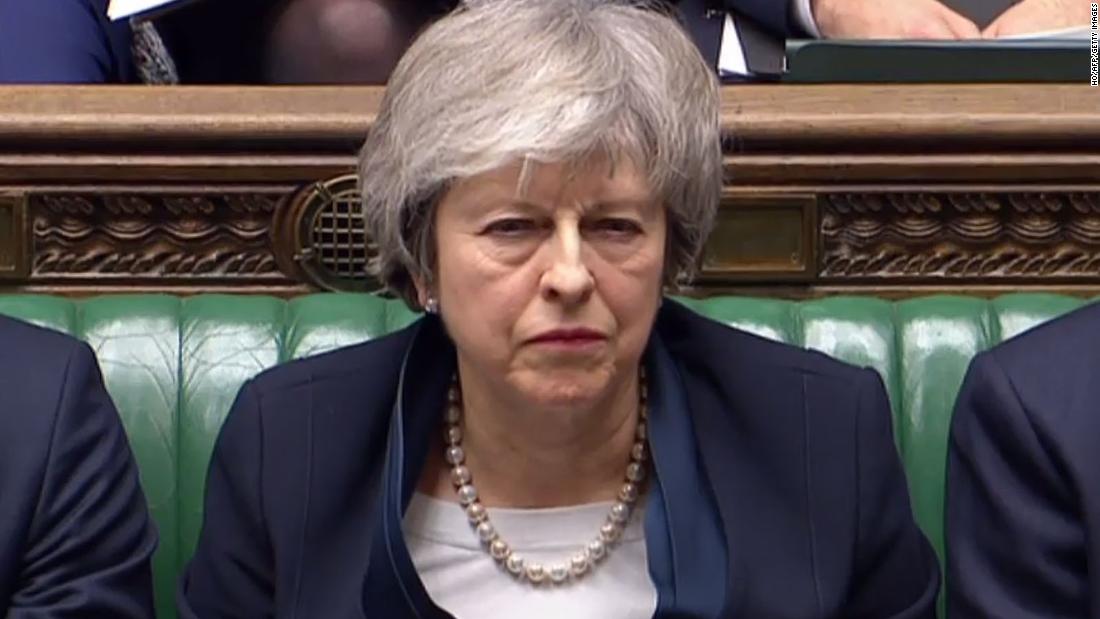
First, we now know for certain what had been assumed to be the case for some time: A majority of UK lawmakers, on all sides of the Brexit divide, so disliked the deal May had cooked up with the European Union that they were willing to kill it. Her government suffered a record loss of 432 votes to 202 -- a margin of 230 that puts it in the history books.
Even the most optimistic members of May's inner circle didn't think the government could win the so-called "meaningful vote." In some respects, the point of holding the vote wasn't to win it, but to drag MPs into the open and make clear to the EU the strength of opposition to May's deal. It was only ever going to be a numbers game -- how thumping would the defeat be?
Second, the UK is still on track to leave the EU on March 29, 2019 -- with or without a deal. That's because on March 29, 2017, May delivered a notification to the EU Council President, Donald Tusk, under article 50 of the EU's Lisbon Treaty.
Article 50 is a legal mechanism that sets into motion a process by which, after two years, a member state legally ends its EU membership either with an agreed exit deal or the immediate termination of all the shared legal arrangements that accompany membership. Nothing about Tuesday's vote has altered that trajectory.
Coming back to the first point, there is a serious question that must now be asked of the UK's political class. We know what they are against, but what are they for?
Of the many Brexit options on the table, we are none the wiser as to which can command the parliamentary majority that May seeks to secure.
This leaves parliament -- and by extension, the government -- in one big mess, with few clear options.
After the vote, May challenged the leader of the opposition Labour Party, Jeremy Corbyn, to put forward a motion of no-confidence in the government. He did, and it will be debated on Wednesday.
It is far from certain that May will lose this vote. Just because her own Conservative MPs hate her Brexit deal, it would be foolish to assume that they would bring down their own government. But if they do, then May -- or another leader -- has 14 days to try again to win a confidence vote.
If that fails, then the next stage would most likely be a general election. Both main parties, one can only assume, would run on a promise that they would settle Brexit once and for all.
The trouble is, the process of holding a general election would take longer than the 73 days left until March 29. So unless someone extends the article 50 process in the meantime, it's hard to see how the UK doesn't simply crash out without a deal.
If May survives the confidence vote, then the most obvious next step is returning to Brussels and getting further assurances from the EU on the future relationship, pertaining in particular to the Irish Border "backstop" (which if you are so inclined, you can read more about here.)
The thing is, the deal May has struck with the EU is essentially only an initial divorce agreement. It gets the UK over the Brexit deadline and into a holding pattern, where the two parties then enter negotiations about what comes next. Beyond that, most options -- except for no-deal and remaining in the EU, -- are still on the table.
The EU has been consistent since the withdrawal agreement negotiations ended that there would be no further concessions. Not everyone believes her, it would seem, but the view from Brussels is solid. As one EU source familiar with the negotiations said to me, the mood in Brussels is that after losing the vote, "May will get on a plane and demand more from us instead of getting her own s*** together."
Not everyone in Westminster believes this. Some people are confident that if May threatens to walk away, having proved once and for all that her parliament hates the deal, the EU will blink.
It's an optimistic and risky strategy, given the looming Brexit deadline.
So what has the meaningful vote taught us? Very little that we didn't already know: without parliament getting its act together, Britain and the European Union could be heading for quite a messy split.
It's nothing short of staggering the that so close to the deadline, the 66 million citizens of the UK, the millions more across continent and everyone else that stands to lose out if this horror show isn't resolved soon.
No comments:
Post a Comment